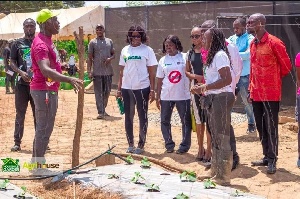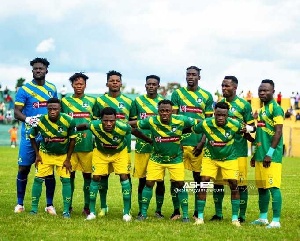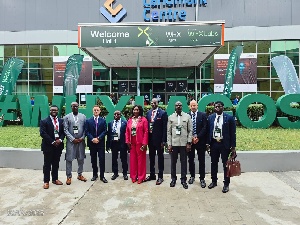Business News of Tuesday, 27 May 2025
Source: www.ghanawebbers.com
Boost-to-Bloom project: Unlocking youth-led horticulture for growth in northern Ghana
Northern Ghana has great agricultural potential. The Boost-To-Bloom project aims to unlock this potential. It provides structure, training, and market connections.
Youth unemployment is highest in northern Ghana. Agriculture here is often subsistence-based and disconnected from value chains. The Boost-To-Bloom project offers a new approach to agribusiness. This approach focuses on youth, markets, jobs, and processing opportunities.
From 2025 to 2028, the project will empower 20,000 young people. It targets women and persons with disabilities in five regions: Upper East, Upper West, Savannah, North East, and Northern Regions. Participants will attend bootcamps for mentorship and business incubation.
They will learn to cultivate horticultural crops and establish input supply services. They will also build profitable agribusiness ventures. Alberta Nana Akyaa Akosa of Agrihouse Foundation said this initiative builds ecosystems of entrepreneurs.
A key focus of the Boost-To-Bloom project is value addition and market access. Beneficiaries will learn food processing techniques for shelf-ready products like tomato paste and dried onions. This aligns with Ghana’s Feed Ghana strategy to boost agricultural productivity.
The initiative aims for national food self-sufficiency and export readiness by strengthening local production of vegetables like tomatoes and peppers. AGRA supports the program to create system-level impact beyond individual training.
This includes establishing agribusiness networks across all five regions. Youth will connect with local buyers through structured aggregation hubs. There will also be policy engagement to improve conditions for youth-led agribusinesses.
Dr. Betty Annan from AGRA emphasized that they are providing leverage along with skills. Historically, women and persons with disabilities have been excluded from land and credit in agriculture. The Boost-To-Bloom project places them at the center of its efforts.
Participants will receive training in agronomy, processing, business management, cooperative governance, leadership, and technology use. Women will get targeted support to overcome barriers in growing collective enterprises.
In a region where women farmers face challenges entering markets, this investment aims to create thousands of dignified jobs while changing perceptions about leadership in agriculture.
The Boost-To-Bloom project builds on Agrihouse’s previous success with the One Household, One Garden Initiative (1H1G). That initiative helped over 5,000 households achieve food self-sufficiency during COVID-19.
Ibrahim Ayishetu is a beneficiary from Gushiegu who joined the initiative to utilize her land effectively. She wanted to grow vegetables for herself and her elderly mother but initially struggled with seedling growth due to over-watering.
With help from an Agricultural Extension Agent (AEA), she received new seeds after her first failure. She successfully grew lettuce and cabbage using these seeds.
Afterward, two neighbors asked her for help nursing their seeds as well. She began selling seedlings after six weeks of success and earned Ghc320 profit.
Tahidu Tayiba from Gushegu District praised the One Household One Garden Project too. Over six weeks she picked fresh vegetables daily without buying them externally anymore.
This change allowed her family to spend money on fish and meat instead of vegetables—improving their meals' nutritional value significantly.
While 1H1G focused on backyard food security; Boost-To-Bloom scales up from garden work into enterprise development.
The new program incorporates lessons learned from Agrihouse’s AG-STUD Bootcamp which has guided many students into agribusiness careers.
Boost-To-Bloom aims to create at least 5,000 jobs in its first phase.
It contributes directly towards market stability while reducing post-harvest losses.
This model can serve governments or investors looking to support rural transformation through youth initiatives.
Akosa stated that this is not just a one-off effort; it serves as a blueprint for youth-led agricultural transformation across Africa.
AGRA's support aligns with its goal of promoting inclusive agricultural transformation through enterprising models that enhance resilience.
Under its 3.0 strategy; AGRA focuses on enabling youth entrepreneurship alongside resilient food markets.
By integrating Boost-To-Bloom into national narratives; AGRA fosters horticultural growth in Northern Ghana.
At a time when food security is critical; this community-driven solution unites youth strengths with smart policy design.
Boost-To-Bloom represents more than just development—it embodies an economic strategy in action.











